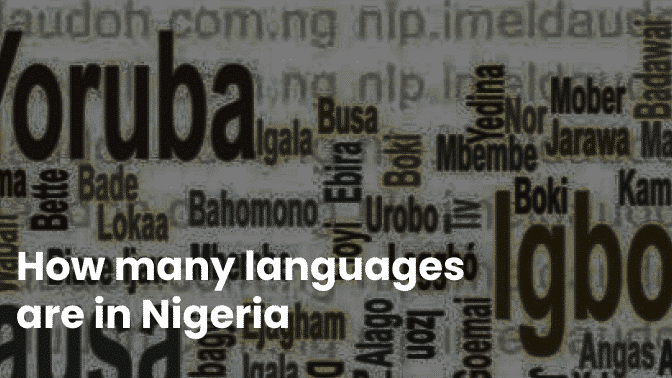Nigeria is a linguistically diverse country located in West Africa, with over 250 ethnic groups and a population of approximately 211 million people. As a result of this diversity, the country is home to a vast array of languages, with estimates ranging from 500 to 600 different languages spoken throughout the country. In this article, we will explore the linguistic landscape of Nigeria and the factors that contribute to its diversity.
The official language of Nigeria is English, which was inherited from the country’s colonial past. This language serves as a lingua franca, allowing Nigerians from different linguistic backgrounds to communicate with each other and with the outside world.
However, English is only spoken as a first language by a small percentage of the population, primarily those who were educated in British-style schools or have had exposure to the language through other means.
In addition to English, there are three major languages that are widely spoken in Nigeria: Hausa, Yoruba, and Igbo. These three languages are the most prominent and have the largest number of speakers, with Hausa being spoken primarily in the northern part of the country, Yoruba in the southwest, and Igbo in the southeast.
These languages have a long history and rich cultural significance and are often used as markers of ethnic identity.
Beyond these major languages, there are many other languages spoken throughout Nigeria. These languages can be grouped into several different language families, each with its own distinctive features and characteristics. Some of the major language families represented in Nigeria include the Niger-Congo, Afro-Asiatic, Nilo-Saharan, and Khoisan families.
The Afro-Asiatic family is another important language family in Nigeria, particularly in the northeastern part of the country. This family includes languages such as Hausa, Fulfulde, and Kanuri.
The Nilo-Saharan family is spoken primarily in the northern part of Nigeria and includes languages such as Kanuri, Beri, and Daza. Finally, the Khoisan family is spoken by a small number of people in the far northeastern part of Nigeria and includes languages such as Gyele and Gokana.
The languages are spoken in Nigeria
Some of the major languages spoken in Nigeria, along with a brief explanation of each language:
- Hausa: Hausa is a major language spoken in northern Nigeria and is one of the largest ethnic groups in the country. It belongs to the Afro-Asiatic language family and is written using the Arabic script. It is also widely spoken in other West African countries such as Niger, Ghana, and Chad.
- Yoruba: Yoruba is a major language spoken in southwestern Nigeria and is the native language of the Yoruba people. It belongs to the Niger-Congo language family and is written using a modified Latin alphabet. It is also spoken in neighbouring countries such as Benin and Togo.
- Igbo: Igbo is a major language spoken in southeastern Nigeria and is the native language of the Igbo people. It belongs to the Niger-Congo language family and is written using a Latin-based alphabet. It is also spoken in other West African countries such as Cameroon and Equatorial Guinea.
- English: English is the official language of Nigeria and is used for official purposes, education, and business. It was inherited from Nigeria’s colonial past under British rule and is spoken by a small percentage of the population as a first language.
- Pidgin English: Pidgin English is a creole language that developed as a means of communication between different ethnic groups during the colonial era. It is widely spoken throughout Nigeria and is used as a lingua franca in many parts of the country.
- Fulfulde: Fulfulde is a language spoken by the Fulani people, a nomadic ethnic group that is spread throughout West Africa. It belongs to the Niger-Congo language family and is written using the Arabic script. It is also spoken in other West African countries such as Cameroon and Mali.
- Kanuri: Kanuri is a language spoken in northeastern Nigeria and is the native language of the Kanuri people. It belongs to the Nilo-Saharan language family and is written using the Arabic script. It is also spoken in neighbouring countries such as Niger, Chad, and Cameroon.
- Tiv: Tiv is a language spoken in central Nigeria and is the native language of the Tiv people. It belongs to the Benue-Congo sub-family of the Niger-Congo language family and is written using a Latin-based alphabet.
- Edo: Edo is a language spoken in southern Nigeria and is the native language of the Edo people. It belongs to the Benue-Congo sub-family of the Niger-Congo language family and is written using a Latin-based alphabet.
- Efik: Efik is a language spoken in southeastern Nigeria and is the native language of the Efik people. It belongs to the Cross River branch of the Niger-Congo language family and is written using a Latin-based alphabet.
These are just a few examples of the many languages spoken in Nigeria, and each language has its own unique history, culture, and significance to the people who speak it.
Read Also: What are the Best Art Courses in Nigeria?
What are the top 3 languages spoken in Nigeria?
The top three languages spoken in Nigeria, based on the number of native speakers, are:
- Hausa: Hausa is the most widely spoken language in Nigeria, with approximately 25% of the population speaking it as their first language. It is the native language of the Hausa people, who are primarily located in northern Nigeria.
- Yoruba: Yoruba is the second most widely spoken language in Nigeria, with approximately 21% of the population speaking it as their first language. It is the native language of the Yoruba people, who are primarily located in southwestern Nigeria.
- Igbo: Igbo is the third most widely spoken language in Nigeria, with approximately 18% of the population speaking it as their first language. It is the native language of the Igbo people, who are primarily located in southeastern Nigeria.
It is important to note that Nigeria has over 500 different languages, and these three languages are just a small representation of the linguistic diversity in the country.
Conclusion
Nigeria is a linguistically diverse country with hundreds of different languages spoken throughout its various regions. While English serves as the official language, there are several major languages that are widely spoken, as well as numerous other languages belonging to different language families. The diversity of Nigeria’s languages is a testament to the country’s rich cultural heritage and highlights the importance of preserving linguistic diversity as a vital part of our global cultural heritage.




